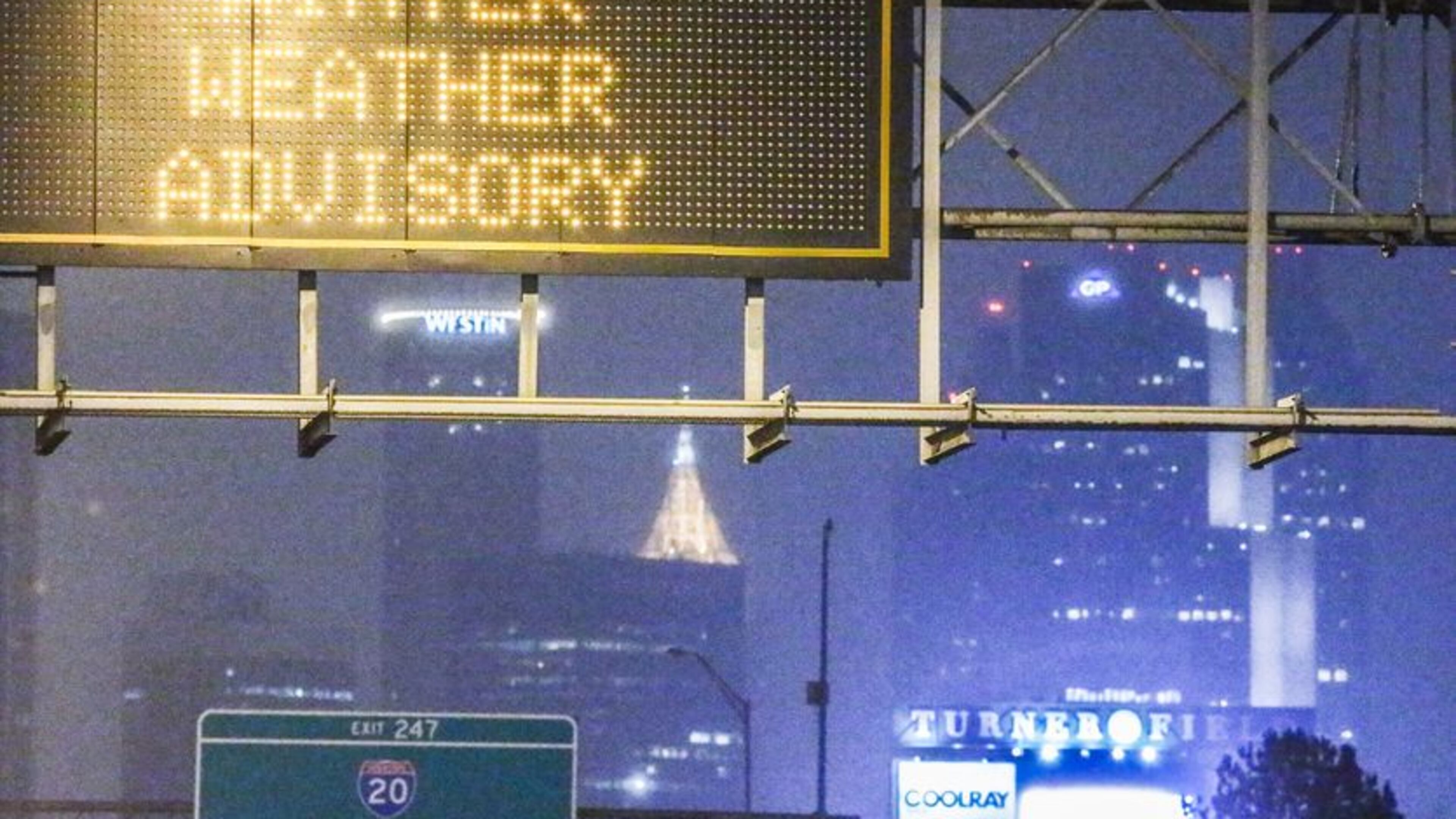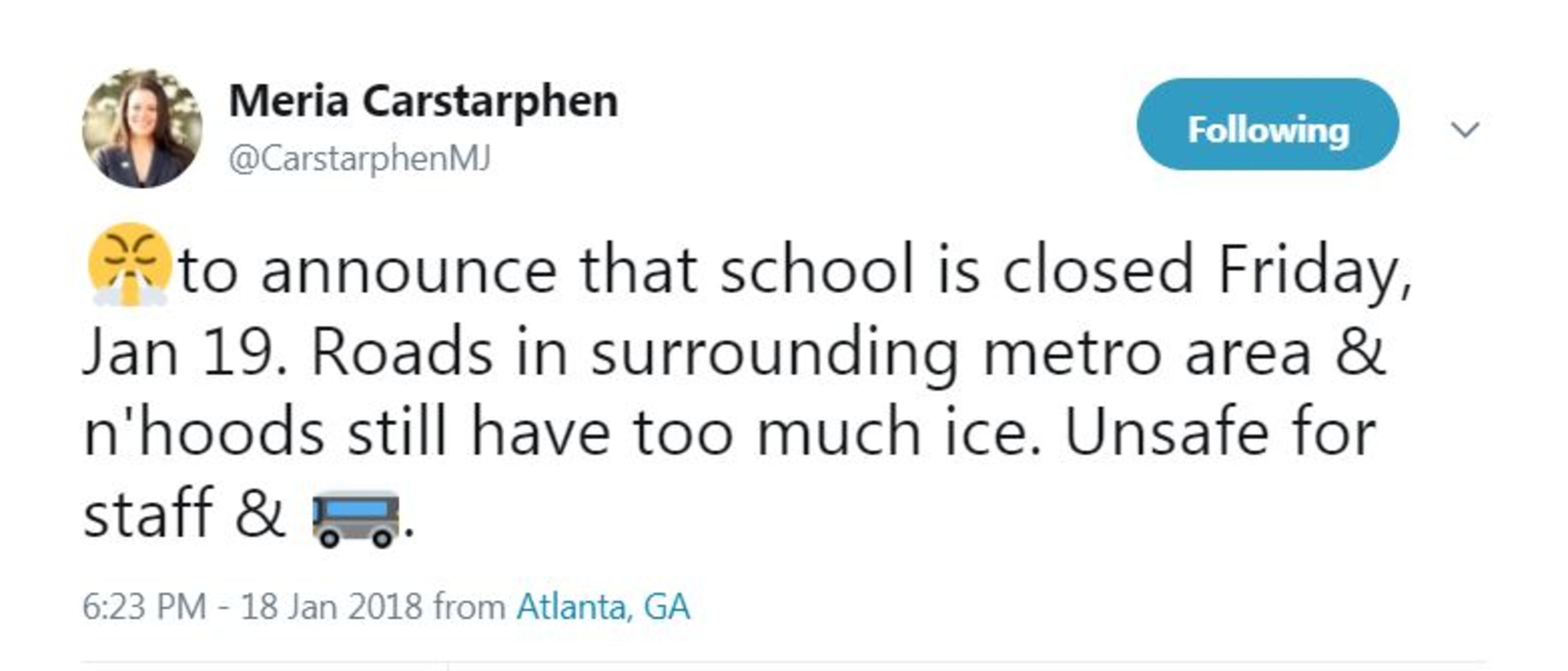About these snow days: Should districts make them up and when?

UPDATE: Atlanta Public Schools announced at 6:30 p.m. Thursday that it will close Friday due to unsafe roads.

In a note to parents today, Atlanta Public Schools Superintendent Meria Carstarphen summarizes the challenges facing districts trying to decide whether to make up days lost to bad weather, including three this week.
Under new flexibility contracts with the state, most Georgia districts aren't obligated to recover the days. However, that missing learning time can undercut student performance, and that's what worries local school chiefs, including Carstarphen. Most districts have shut down more than usual due to fierce weather including Hurricane Irma in September.
A few years back, I wrote about a 2009 study, "You Can't School Mother Nature," in which researchers examined how Maryland and Colorado schools performed on state assessments in years when there were frequent snow days compared to years when there were fewer. The study found the percentage of students passing math assessments drops by about one-third to one-half of a percentage point for each day school is closed.
In an academic year with five snow day closures, the study said, "The number of 3rd graders performing satisfactorily on state reading and math assessments within a school is nearly 3 percent lower than in years with no school closings. The impacts of closure are largest in mathematics and for students in lower grades."
However, a 2014 Harvard study of snow closures found whole-school closings did not hurt student achievement; what did hurt achievement were student absences when schools didn't close for storms but some parents kept their children home. That's because it is easier for teachers to catch up a full class that missed a lesson due to a school closing than individual students who miss days here and there and require special coordination to be brought up to speed.
Joshua Goodman, an assistant professor of public policy at Harvard’s Kennedy School of Government, reviewed Massachusetts weather data, test scores and attendance records between 2003 and 2010 and concluded the number of canceled school days for snow didn't affect math and reading scores. A contributing factor: Schools in Massachusetts routinely add extra days to their yearly schedules to compensate for snow closings. So those lost days are made up.
An option -- see below -- that APS is putting before parents to address its six closures so far this year: Add 15 minutes to the start and end of each day to build back the lost time. However, the National Center on Time & Learning says that approach is not an effective substitute for whole class periods.
With that background, here is Carstarphen's note to parents:
As you know, we had to cancel classes and all school activities today, Thursday, January 18, due to inclement weather. The sun may be out, but it is still brutally cold outside and ice is everywhere. We can't have our students, teachers and staff members on the roads going to and from school and school activities. It's just not safe yet.
Thursday is the sixth school day that we will have missed due to the weather since the start of the school year in August. I know many people are now starting to ask the inevitable question: Do we have to make up these days, and if so, when and how will we do it?
First, allow me to clarify something about how many days we are required to make up. The Atlanta Public Schools charter with the Georgia Department of Education DOES NOT require us to make up days. BUT, I am concerned about the significant loss of instructional time we have suffered. So, we are looking at ways we can make up the equivalent of approximately three instructional days before the end of the school year.
One of the complicating factors I must consider when exploring make up days is that we have historically paid our employees even when the district is closed for inclement weather. Many of our employees depend upon a consistent paycheck to pay their bills, which is why we do not reduce their pay when Mother Nature doesn't cooperate. However, if we make up days during a time that was otherwise scheduled to be a paid holiday, we will have to ask employees to come in to "make up" these days in order to ensure that the make-up options are cost-neutral. That may seem like a logical request of our employees, but it is not something we have had to do in recent history. We haven't been in the position of making up days for quite some time, so asking employees to "make up" paid holidays will undoubtedly cause confusion.
Having said all of that, we would like some assistance from you to help us make the best decision for everyone in APS. We have created a survey (click here) with six options for making up the time. We chose these options based on the following factors:
We do not want to extend the school year past Memorial Day Weekend, so as not to conflict with summer travel/vacation plans;
We do not want to require students and staff to come to school on Saturdays to ensure maximum attendance; and,
We do not want to conflict with Spring Break so as not to interfere with travel/vacation plans.
Here are the options:
Option 1 – Make up the days on February 19 – 21 during Winter Break
Pros: consolidates make up days; teachers are already scheduled to work February 19
Cons: families and staff may have already scheduled travel for the President's Day Weekend and/or Winter Break; will require employees who are paid when school is closed for inclement weather to "make up" the days without additional pay to ensure the plan is cost neutral
Option 2 – Make up the days on February 21 – 23 during Winter Break
Pros: consolidates make up days; does not conflict with potential travel plans for President's Day Weekend
Cons: families and staff may have already scheduled travel for Winter Break; will require employees who are paid when school is closed for inclement weather to "make up" the days without additional pay to ensure the plan is cost neutral
Option 3 – Make up the days on February 19-20 during Winter Break and March 19 professional learning day
Pros: spreads out make up days to minimize impact on Winter Break; teachers are already scheduled to work on February 19 and March 19
Cons: families and staff may have already scheduled travel for President's Day Weekend and/or Winter Break; takes away 2 critical professional learning days for staff; will require employees who are paid when school is closed for inclement weather to "make up" the days without additional pay to ensure the plan is cost neutral
Option 4 – Make up the days on February 22 -23 during Winter Break and March 19 professional learning day
Pros: spreads out make up days to minimize impact on Winter Break; does not conflict with potential travel plans for President's Day Weekend; teachers are already scheduled to work on March 19
Cons: families and staff may have already scheduled travel for Winter Break; takes away a critical professional learning day for staff; will require employees who are paid when school is closed for inclement weather to "make up" the days without additional pay to ensure the plan is cost neutral
Option 5 – Add 30 minutes to end of the day from January 29 to March 30
Pros: does not conflict with potential travel plans for families and staff; does not interfere with critical professional learning days for staff; likely to have the better attendance than Options 1 – 4 as students will already be in school; will not require employees to "make up" days without additional pay
Cons: will require flexibility with start times for athletics and other extracurricular events after school; will require schools to implement plans to ensure instructional time is maximized and not wasted as "extra time" added on to schedule; will require strategies to ensure the plan is cost neutral
Option 6 – Add 15 minutes to start of the day and 15 minutes to end of the day from January 29 to March 30
Pros: does not conflict with potential travel plans for families and staff; does not interfere with critical professional learning days for staff; likely to have better attendance than Options 1 – 4 as students will already be in school; minimizes impact on after school activities; will not require employees to "make up" days without additional pay
Cons: will require some flexibility (though less than option 5) with start times for athletics and other extracurricular events after school; may result in more students being tardy to school; will require schools to implement plans to ensure instructional time is maximized and not wasted as "extra time" added on to schedule; will require strategies to ensure the plan is cost neutral
Please take a minute to complete the survey. We want to hear from everyone – students, parents and staff. The survey will be taken down at 11:45 p.m., Sunday, January 21. Keep in mind that you will only be able to vote one time.
I can assure you that the results will play a significant role in the decision we make. Also, we plan to do some informal polling of our principals and other administrators. Once we have all the facts and opinions, we will be sure to announce our decision in a timely manner.
So, that's where we are. We will also begin exploring contingency plans for any future closings due to bad weather, as we are at a point where we will need to explore options for employee pay on inclement weather closing dates.



